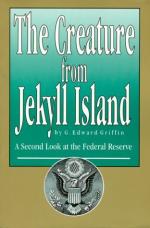
|
| Name: _________________________ | Period: ___________________ |
This test consists of 5 multiple choice questions, 5 short answer questions, and 10 short essay questions.
Multiple Choice Questions
1. Why was the "Federal Reserve System," so named?
(a) The "Federal Reserve System" was so named so that people would think it was part of the Federal government.
(b) The "Federal Reserve System" was so named so that people would have respect for it.
(c) The "Federal Reserve System" was so named so that people would know that it was part of the Federal government.
(d) The "Federal Reserve System" was so named because its offices were not state run.
2. Why did all nations become socialistic in the New World Order?
(a) In the New World Order, all nations became socialistic as a result of the abandonment of the gold standard.
(b) In the New World Order, all nations became socialistic through United Nations declaration.
(c) In the New World Order, all nations became socialistic through the use of the IMF and direct loans from the industrialized nations to the undeveloped nations.
(d) In the New World Order, all nations became socialistic through deficit loan practices.
3. What resulted after the first electronic run on banks in 1983?
(a) The first electronic run on banks happened in 1983, leading to one trillion dollars being added to the deficit.
(b) The first electronic run on banks happened in 1983, leading to a massive bailout in the $6 billion range.
(c) The first electronic run on banks happened in 1983, leading to a collapse of the economy.
(d) The first electronic run on banks happened in 1983, leading to a hoarding of cash.
4. The nationalization of banks has occurred during conservative or liberal administrations?
(a) The nationalization of banks occurred when there is equal balance among all branches of government.
(b) The nationalization of banks occurred during conservative administrations.
(c) The nationalization of banks occurred during conservative as well as liberal administrations.
(d) The nationalization of banks occurred during liberal administrations.
5. What is laudable about the author's work?
(a) The author provided a clear and concise liberal viewpoint.
(b) The author provided a clear and concise conservative viewpoint.
(c) The author had majored in international economics.
(d) The author did provide a convincing argument that our economic system had been broken at some time in the past.
Short Answer Questions
1. What is the definition of a public run on a bank?
2. What importance does political ideology have on the nationalization of banks?
3. What was the main argument in favor of nationalizing banks?
4. How was some property converted for home ownership during the 1980s?
5. How were the policies of FDR's administration a departure from capitalism?
Short Essay Questions
1. According to Chapter 2, how did people react to the creation of new money?
2. According to Chapter 1, what did over-lending by banks result in?
3. According to Chapter 1, what was the main purpose of the Federal Reserve System?
4. In Chapter 2, why did banks make risky loans?
5. In Chapter 1, how is a "public run" defined?
6. According to Chapter 3, what were some of the major organizations helped by government bailouts?
7. According to Chapter 4, what presidential action may have contributed to the economic woes?
8. In Chapter 2, how did the banks make their money?
9. According to Chapter 2, what is the Federal Deposit Insurance Corporation?
10. In Chapter 2, how did the author characterize the problems with the banking system?
|
This section contains 1,011 words (approx. 4 pages at 300 words per page) |

|




